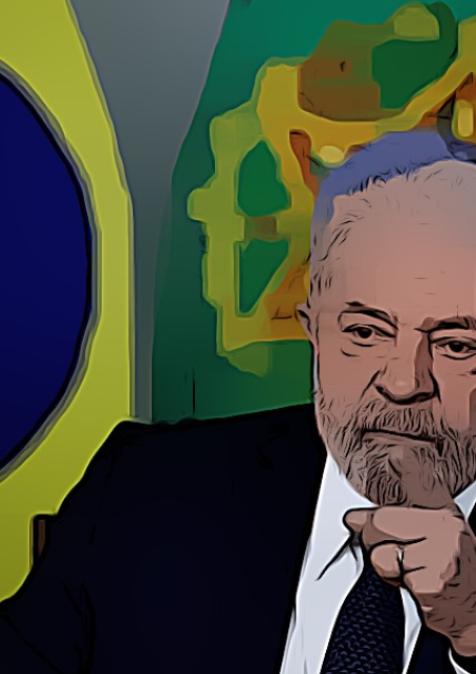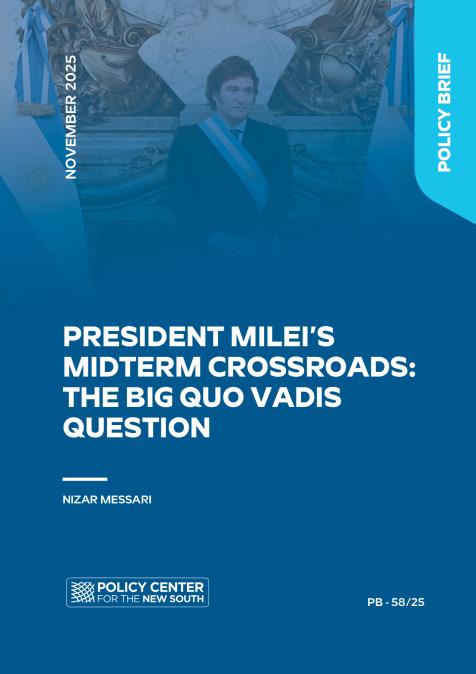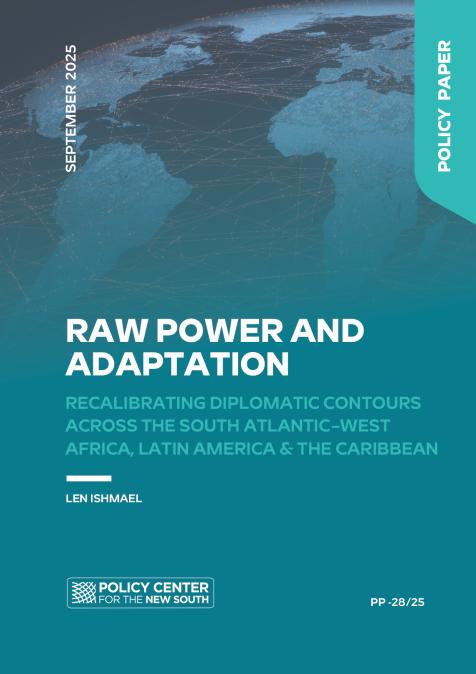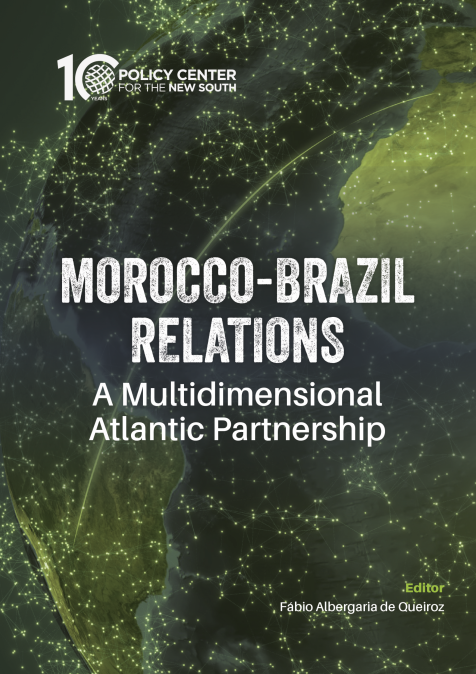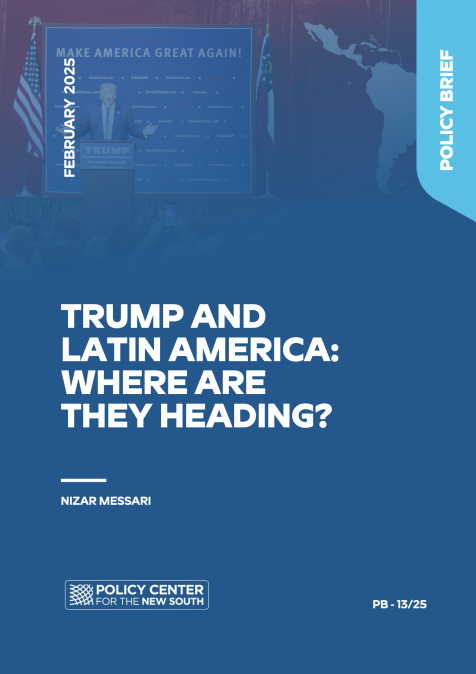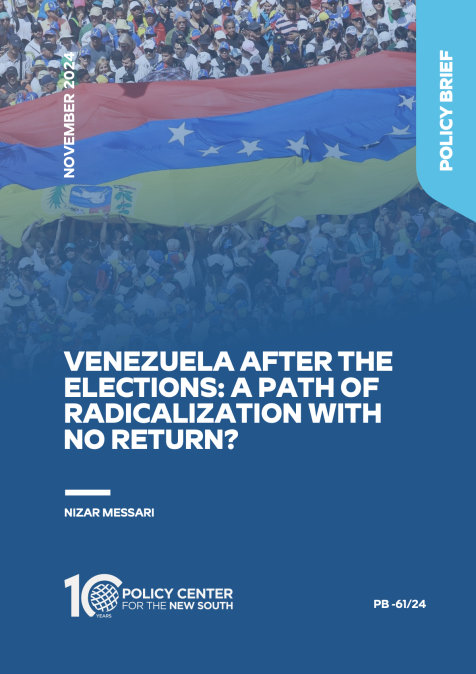Publications /
Opinion
This article was written by an external contributor. The author is not affiliated with the Policy Center for the New South, and the views expressed herein are solely those of the author.
The Liberal International Order (LIO), established in the aftermath of WWII, is now facing unprecedented challenges. Though the main proponent of this same Order, the United States under Donald Trump has turned against traditional allies and is actively seeking to undermine the very logic of the multilateral system. The administration argues that the heightened interdependence of the past three decades has gone awry, that traditional outsiders, such as China and much of the so-called Global South,[1] had manipulated the system to their advantage, and that an aggressive, unilateralist approach, based on the notion that might makes right, was necessary to restore the “natural” international hierarchy of power. While other powerful nations may be tempted to follow suit, with potentially destabilizing effects globally, such a path is simply not viable for most countries, making autonomy through multilateralism even more vital.
It is true that the multilateral structures created under the LIO did not equitably address the needs of both industrialized and developing societies. Nonetheless, it was at least partially within the very arenas of global representation and deliberation created after 1945 that many countries of the Global South found the opportunity to advance their needs and demands on the global stage. These nations often pushed the boundaries of these institutions, redefining their roles and modes of operation. This process was complex and uneven, and the gains were not evenly shared. However, the gradual expansion of the agendas of multilateral organizations—to include themes such as development and unfair trade—was a direct result of the assertive and independent mobilization of decolonized nations.
After all, it was only after the creation of the Non-Aligned Movement (NAM) in September 1961 that the United Nations General Assembly (UNGA) decided to host its first Conference on Trade and Development in the spring of 1964, leading to the creation of a new international agency (UNCTAD) focused on addressing the development concerns of what was then referred to as the Third World. Brazil’s independent foreign policy at that time—known as Política Externa Independente (PEB)—allowed Latin America’s largest nation to play an important role in this process, even though it never formally joined the NAM. Notably, despite the US-supported, right-wing military coup in March of the same year, which curtailed the fulfillment of its autonomist approach, Brazil would go on to become a central actor within the Group of 77—a coalition of developing nations created at the first UNCTAD meeting. Brazil's engagement in the G77 reflected its long-standing commitment to multilateralism and its broader foreign policy objective of reshaping the international development agenda, increasingly through the promotion of South-South cooperation.
Though a central focus of its foreign policy, Brazil’s continued pursuit of a sovereign diplomatic path has not been easy, as the country has consistently faced challenges in promoting the interests of a rising economy within the constraints imposed by US hegemony in the Western hemisphere. In this constrained context, Brazilian elites have historically viewed the defense of multilateralism as a key component of their diplomatic efforts. And given the ongoing erosion of multilateral system, which poses major new challenges to societies in the Global South, examining Brazil’s trajectory of growing engagement in multilateral initiatives may offer valuable insights into the dilemmas faced by middle powers amid the current unraveling of multilateralism.
Brazil’s Long Search for Autonomy within Structural Constraints
In a general sense, up to the 1930s, Brazilian foreign policy was characterized by friendly relations with both Europe and the United States, the main destinations for the country’s primary exports and key sources of its political models and cultural influences. During the Good Neighbor Policy initiated by Franklin D. Roosevelt, Brazil-U.S. relations deepened, including through strategic cooperation during the Allied war effort in the early 1940s. However, the fundamental shift in U.S. foreign policy brought on by the Cold War presented new challenges for Brazil’s development-oriented diplomatic aspirations.
In the following decade, the country embarked on a historic process of fast-paced, state-led industrialization based on the import-substitution recipe put forward by the UN’s Economic Commission for Latin America and the Caribbean (ECLAC). While this model relied on U.S. capital and technology, it was not always welcomed by American policy leaders. Unsurprisingly, these transformations gave rise to new socio-economic and political demands that called for institutional reform—reforms that both Brazilian and U.S. elites were often reluctant to pursue.
As a result, the 1960s saw the collapse of Brazil’s democratic order, in place since the end of World War II, and the establishment of a conservative dictatorial regime that remained aligned with Washington throughout the height of the Cold War in Latin America until the mid-1980s. Counter-intuitively, however, the 1970s witnessed a revival of elements from Brazil’s earlier Independent Foreign Policy, now adapted to a new international context marked by an unprecedented surge in southern mobilization.
The climate of détente between the superpowers created a more favorable environment in which both members and non-members of the Non-Aligned Movement could push long-standing demands for a more inclusive world order to the forefront of multilateral institutions. In 1974, the UN adopted a resolution calling for the establishment of a New International Economic Order (NIEO), which can be seen both as the clearest acknowledgement of the structural limitations of the existing multilateralist system and a testament to its capacity for adaptation in response to the needs and hopes of nations in the south.
Navigating this unique international scenario, defined by ambitious global initiatives amidst continued Cold War constraints, Brazilian elites supported elements of the Third World agenda while sustaining good relations with the United States, particularly on the economic front. The very existence of multilateral channels to advance the agenda of developing states proved central to Brazil’s continued developmental path. Moreover, although the country had to implement painful structural economic reforms—formulated by multilateral financial agencies such as the IMF—throughout the 1990s, when a left centered coalition managed to assume power in the early 2000s, Brazilian leaders were able to bring back to the fore a more autonomist line of foreign policy.
The 21st Century: New Opportunities and Risks
At the new century dawned, Brazil seemed on the verge of crossing the supposed threshold of underdevelopment, thanks both to the consolidation of its democratic institutions and an unprecedented level of socio-economic inclusion. The country could thus assume an ambitious, lofty, and active diplomatic approach—as sustained by the influential diplomat Celsol Amorin, who served as Foreign Minister under Lula’s first two terms—which expanded the nation’s involvement in regional (UNASUR, CELAC) and global (G20, BRICS) multilateral initiatives, while maintaining good relations with traditional partners such as the United States and the European Union.
China’s growing economic presence in Latin America, and the high revenues that its expanding market for Brazilian commodity exports provided, certainly aided in these achievements. The more autonomous, or universalistic path (as the country’s diplomatic elites prefer to call it) that Brazilian leaders assumed at the time was nonetheless essential to the many accomplishments of the period. This conclusion is made evident by the diminishing relevance of the country in the last decade, as its democratic institutions faced their most forceful challenge since the experience of re-democratization in the mid-1980s. The associated redirection of the country’s foreign policy towards an associated, at times automatic, and ideologically driven alignment with the United States under Bolsonaro, produced minimal gains.
Since his return to power in 2023, Lula has attempted to replicate the successes of his first term. However, he has faced far less amenable domestic and international scenarios, and thus far, the results have been mixed. In addition to the intensifying hegemonic rivalry between the United States and China and the global conflicts that have fractured countries along belligerent lines, Trump’s direct attacks on the very logic of multilateralism—and its associated channels for deliberation—present unique challenges to middle-power states. These are countries that have learned to leverage the maneuvering spaces such institutions provide to advance their own needs and goals. Brazil occupies a prominent place on that list, and how it proceeds may help illuminate both the limits and opportunities that similar nations may encounter in the coming years.
As a leading nation within the BRICS—and the host of its annual summit in July—Brazil continues to seek innovate ways to promote its national interests. Lula recently advocated for strengthening CELAC, arguing that the region must not be left entirely at the mercy of its powerful (and increasingly erratic) northern neighbor. At the same time, since returning to office, Lula has visited the United States, China and several European countries—signaling Brazil’s persistent strategy of balancing established partnerships with new initiatives, so long as both avenues serve the country’s autonomous, though not confrontational, approach to promoting its developmental needs and ambitions.
In the overlap between the first two years of Lula’s third term and the final two years of the Biden administration, demands from the United States and China for Brazil to align with their respective technological platforms signaled that Brazil’s universalistic foreign policy was once again facing an increasingly narrow path for maneuvering between hegemonic disputes. Now, with Trump’s neo-mercantilist (and arguably rehashed imperialist) approach to the region, pressure is mounting. Will Brazil be able to navigate these rising tensions? And if not, what are the prospects for even smaller and less diversified economies in the Global South?
Responses to these questions will largely depend on what Brazilian leaders are able to articulate both domestically—in defending the country’s democratic institutions against continued pressures from the extreme right—and internationally, particularly in maintaining open and constructive dialogue with actual and potential allies around the globe. Much will also depend on how Brazil’s strategic partners perceive the country and the kind of mutually beneficial collaboration they are willing to pursue.
What’s to be Done?
There is a clear risk—signaled both by Trump himself and by key commentators in recent weeks—that a new balance-of-power scenario may emerge, in which the United States, Russia, and potentially China (the latter two being key members of the BRICS) carve out their own zones of influence around the world. Such a scenario would clearly be detrimental not only to Brazil but also to other major Global South actors within the BRICS, including India and Indonesia. This outcome would mark a clear reversal from the multilateral framework of preceding decades which—though imperfect—nonetheless offered middle powers like Brazil a platform to promote their national interests while also contributing to the democratization of the global agenda.
Lula has recently returned from a historic visit to China, where both countries signed over 30 different agreements aimed at strengthening their relationship across multiple dimensions. Yet, it is to be expected that Chinese leaders are simultaneously negotiating their role in a more multipolar world with other major powers, even as they deepen ties with emerging nations like Brazil. It is therefore incumbent upon Brazil’s political and diplomatic leaders to ensure that the upcoming BRICS summit serves as a crucial platform to persuade the group’s nuclear powers to reject any attempt by the new Trump administration to revive an outdated, unequal, and ultimately unstable approach to global affairs.
[1] Though there is no consensus on the precision of this term, it does remain in use given the remaining disparities, particularly between traditionally industrialized and developing nations.

